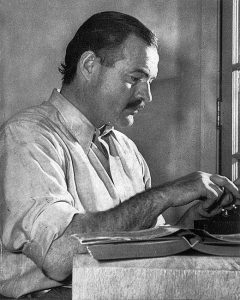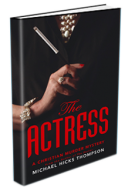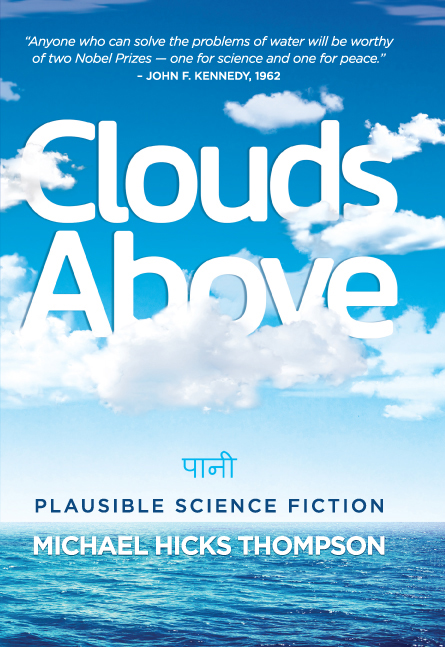I Wrote Myself Into Hemingway’s Paris Interview
 If you’d like some insight into Hemingway’s writing,
If you’d like some insight into Hemingway’s writing,
read his interview in the PARIS REVIEW from 1958.
Earnest Hemingway, The Art of Fiction No.21
Interviewed by George Plimpton
ISSUE 18, Spring 1958
“When a writer omits things he does not know, they show like holes in his writing”
~~ Earnest Hemingway, the PARIS REVIEW
I imagine very few people have a clue about Hemingway’s dislike for being asked about his writing style. There are many insights I could have chosen from this PARIS REVIEW interview in 1958. I can’t list them all, so I’ve cherry-picked my favorites. They just seemed to resonant with me.
PLIMPTON
Do you make a distinction—as E. M. Forster does—between “flat” and “round” characters?
HEMINGWAY
If you describe someone, it is flat, as a photograph is, and from my standpoint, a failure. If you make him up from what you know, there should be all the dimensions.
ME
I want to thank you for not allowing your characters to be clichés, or ‘on-the-nose’.
(He could only roll his eyes at me.)
PLIMPTON
Would you admit to there being symbolism in your novels?
HEMINGWAY
I suppose there are symbols since critics keep finding them. If you do not mind, I dislike talking about them and being questioned about them. It is hard enough to write books and stories without being asked to explain them as well.
PLIMPTON
These questions which inquire into [your] craftsmanship really are an annoyance, aren’t they?
HEMINGWAY
A sensible question is neither a delight nor an annoyance. I still believe, though, that it is very bad for a writer to talk about how he writes. He writes to be read by the eye and no explanations or dissertations should be necessary. You can be sure that there is much more there than will be read at any first reading and having made this it is not the writer’s province to explain it or to run guided tours through the more difficult country of his work.
ME
Whew. That’s pretty abrupt, Papa.
(He could only squint at me, like I was being obtrusive.)
PLIMPTON
Do you enjoy reading over your own books—without feeling there are changes you’d like to make?
HEMINGWAY
I read them sometimes to cheer me up when it is hard to write and then I remember that it was always difficult and how nearly impossible it was sometimes. The Old Man and the Sea could have been over a thousand pages long and had every character in the village in it and all the processes of how they made their living, were born, educated, bore children, et cetera. That is done excellently and well by other writers. In writing you are limited by what has already been done satisfactorily. So, I have tried to learn to do something else. First I have tried to eliminate everything unnecessary to conveying experience to the reader so that after he or she has read something it will become a part of his or her experience and seem actually to have happened. (My bold.) This is very hard to do and I’ve worked at it very hard.
ME
Yes! Fiction should read as if it’s real!
(Neither of them paid any attention to me, as if I wasn’t even there.)
PLIMPTON
Finally, a fundamental question: as a creative writer what do you think is the function of your art? Why a representation of fact, rather than fact itself?
HEMINGWAY
Why be puzzled by that? From things that have happened and from things as they exist and from all things that you know and all those you cannot know, you make something through your invention that is not a representation but a whole new thing truer than anything true and alive, and you make it alive, and if you make it well enough, you give it immortality. That is why you write and for no other reason that you know of.
ME
That’s what I was trying to say. Fiction should be written like it’s reality. Thank you, Ernest and George. I’m sure readers have found this at least somewhat informative. But, there’s another interesting interview anecdote in your life, Papa, that few people know about. In it, you use an unusual metaphor to describe your style of writing. Like that of an airplane engine. Where can we find that interview?
HEMINGWAY
The New Yorker magazine, May 13, 1950. “I bring emotion up to where you can’t stand it, then we level off, so we won’t have to provide oxygen tents for the readers. Book is like engine. We have to slack her off gradually.”
PS
You can read the entire PARIS REVIEW interview here: http://tinyurl.com/z259858






Leave a Reply